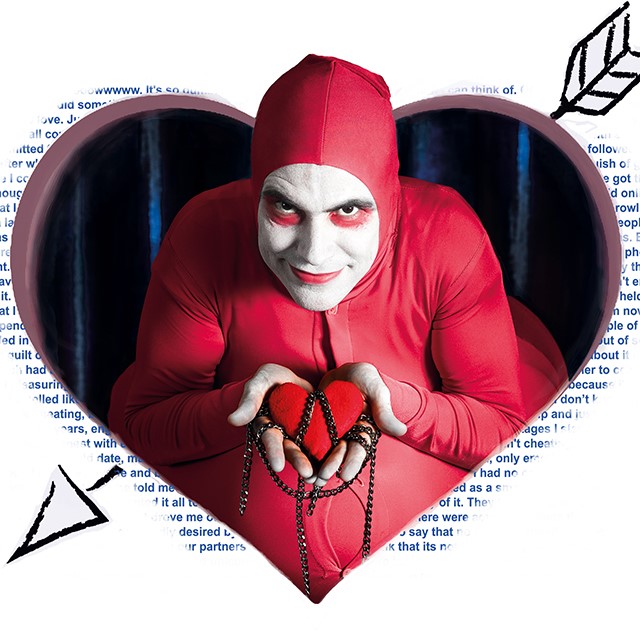Red Bastard: Lie with Me is a buffoonish meditation on the rules of love, lies, and cheating

Red Bastard is an interactive show about love, lies, and lust. A show that’s more interactive than most, it also gets you to confess to some love-related secrets—or just lie. The titular Red Bastard is a bit of a crazy jester character, dressed in bulging red pyjamas and whiteface, and sermonizing on our affection towards lies and lying. That is, we like to lie, but we don’t like to be lied to. Early in the play, the Red Bastard—the beastly jester-like alter ego of performer Eric Davis—has the audience all stand up. As he lists off common lies, audience members who have told that lie must sit down. This is his icebreaker game, to get the audience into the mindset that we are all compulsive liars. Lying makes the world go around.
The Red Bastard’s final lie that catches everyone still standing is the common trope of never reading the terms and conditions but signing off on it anyways. That segues nicely into the rest of his show, which progresses from just lying to lying in love. To the Red Bastard, lying and loving fit together. As he explains it, love and lust have natural laws and cultural mores—like monogamy, his biggest target—and following the cultural norms that most of us do mean lying to ourselves about the instinctual, natural aspects of love.
Of course, the Red Bastard doesn’t just sermonize to us in a jester costume; he involves the crowd every step of the way. This is what makes the show more bouffon than clown, as Red Bastard laughs at the audience more than we, the audience, are laughing at him. He grills the audience repeatedly on if they have cheated on a significant other (one brave audience member admitted he had) and what exactly defines cheating—it’s touching, talking, even thinking, according to the audience.
The Red Bastard spends most of the show quizzing and interacting with the audience, trying to figure out the rules of love. But occasionally Eric Davis sheds his buffoon alter-ego, such as one surprisingly emotional scene in which he shares some memories of his days as a great lover, a dirty horse as he puts it, and plays the concertina, musing on past flames. The actor, we find, just wants to be remembered as a lover, as someone who too every opportunity he could to feel love and passion with other people—even at the cost of emotional pain to his loved ones.
In the end, Davis makes this an opportunity for the audience to watch someone they might look down on, disagree with, secretly sympathize with, because he refused to follow the rules of love. Who makes these rules anyways, the Red Bastard asks, and why do we follow them so obediently that even thinking can be classified as cheating? The audience doesn’t have the right answer, and neither does the Red Bastard. But at least he got us all thinking about our own morality.
Plays at the Nouvelle Scène